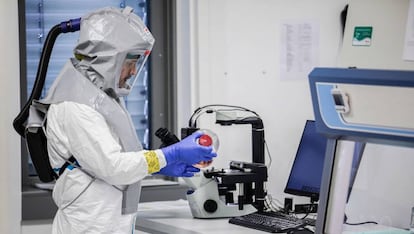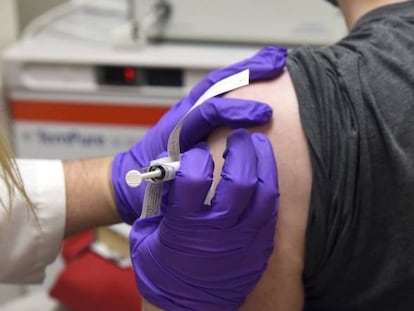Spain prepares to deal with challenges of coronavirus vaccination campaign
The authorities will have to decide who gets the first 20 million doses of a drug that requires ultra-cold storage

The president of the European Commission, Ursula von der Leyen, on Tuesday announced that the EU is authorizing a contract to purchase up to 300 million doses of the coronavirus vaccine developed by BioNTech and Pfizer. Of these, 20 million will go to Spain, according to Spanish Health Minister Salvador Illa.
If all goes well, added Illa, the first doses could arrive by early 2021, and if things go “very, very well,” they could even be available at the end of this year.
The two-dose vaccine will serve to immunize 10 million people in Spain, but it is still unclear who will be prioritized. Before making that decision, Pfizer needs to end its ongoing clinical trial and explain whether the drug is suitable for all age groups and for people with pre-existing conditions, said a spokesperson for Spain’s Health Ministry.
If so, Illa has suggested that healthcare workers and the elderly should get priority in a national vaccination campaign that authorities are beginning to organize. These two groups already represent almost as many vaccines as will be initially available: there are more than nine million people over the age of 65 in Spain, and around half-a-million healthcare workers.
Regional healthcare services and the ministry will have to decide how to carry out the vaccination drive, but unless Pfizer’s trial yields unexpected results, it will likely look a lot like the flu shot campaign, said a source at a regional healthcare service.
Challenges ahead

There will be significant challenges in any case. Currently, only 54% of people over the age of 65 and a third of healthcare workers are getting seasonal flu immunizations. The government’s goal is to reach a higher figure with the coronavirus vaccine among high-risk groups, although vaccination will remain voluntary.
There will also be logistical hurdles: a second dose must be administered 28 days after the first, involving additional work to get a single person immunized. And Pfizer’s vaccine requires ultra-cold conditions – it needs to be stored at about -75ºC, much colder than regular vaccines – which raises distribution and storage issues.
The pharmaceutical company says it is ready to deal with the matter of maintaining the cold chain. “We have developed plans and logistical tools to ensure effective vaccine transportation, storage and continuous temperature control,” said a Pfizer spokesperson. “Our distribution is based on a flexible system that will ship the frozen vials to the vaccine administration point at the required time.”
This means that at first there wouldn’t be a need for a central storage space to keep the vaccines. Instead, they will arrive in containers that can hold 1,800 doses and can maintain ultra-cold conditions for around four weeks.
“The logical thing would be for vaccines to arrive gradually and for them to be administered at the same pace, eliminating the need for storage, but we are also working on alternatives just in case,” said César Hernández, head of the human medicines department at the Spanish Medicines and Health Products Agency (AEMPS).
Primary healthcare centers could be the ones to administer the doses if no special freezers are required
Hernández said the details of the agreement, including distribution arrangements, still need to be discussed. But he believes that primary healthcare centers could be the ones to administer the doses if no special freezers are required. Ultra-cold storage infrastructure is only available at hospital labs, and is too small to hold the amount of coronavirus vaccines that are expected to be sent to Spain.
This expert also said that there are no current plans for vaccines to be made in Spain. But if Pfizer finds itself unable to fill the glass vials fast enough, it could resort to other companies for help.
“What we’ve done here at AEMPS is to analyze its capabilities and put them at the pharmaceutical company’s disposal,” he said. There are companies that have signed deals to help bottle the vaccines developed by Moderna and Oxford, and they could presumably do the same with Pfizer’s if necessary.
Pharmaceutical companies with vaccines in Phase 3 trials have been rushing to make doses ahead of their approval by drug safety authorities. Once approval is secured, they will be rolled out in an effort to immunize most of the population in the space of around one year.
Míriam Alía, an emergency coordinator at Doctors Without Borders, said she has never before encountered such a challenge, even though her own experience includes taking Ebola vaccines – which also require ultra-cold conditions – to remote corners of the Republic of the Congo. Alía said that it will be difficult to take the coronavirus vaccine to some rural parts of Spain while preserving the required conditions of time, storage and temperature.
And Spanish hospitals lack enough ultra-cold freezers because no medication had, until now, required such low storage temperature, explained Olga Delgado, president of the Spanish Society of Hospital Pharmaceuticals.
None are available either at primary healthcare centers, where vaccines are stored at temperatures ranging between 2ºC and 8ºC, said Francisco Álvarez, coordinador of the vaccines advisory committee at the Spanish Pediatrics Association. Álvarez said that shots should be administered at local healthcare centers so that seniors and other vulnerable people are not forced to make trips to the hospital.
English version by Susana Urra.
Tu suscripción se está usando en otro dispositivo
¿Quieres añadir otro usuario a tu suscripción?
Si continúas leyendo en este dispositivo, no se podrá leer en el otro.
FlechaTu suscripción se está usando en otro dispositivo y solo puedes acceder a EL PAÍS desde un dispositivo a la vez.
Si quieres compartir tu cuenta, cambia tu suscripción a la modalidad Premium, así podrás añadir otro usuario. Cada uno accederá con su propia cuenta de email, lo que os permitirá personalizar vuestra experiencia en EL PAÍS.
¿Tienes una suscripción de empresa? Accede aquí para contratar más cuentas.
En el caso de no saber quién está usando tu cuenta, te recomendamos cambiar tu contraseña aquí.
Si decides continuar compartiendo tu cuenta, este mensaje se mostrará en tu dispositivo y en el de la otra persona que está usando tu cuenta de forma indefinida, afectando a tu experiencia de lectura. Puedes consultar aquí los términos y condiciones de la suscripción digital.








































